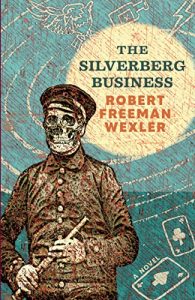Ian Mond Reviews The Silverberg Business by Robert Freeman Wexler
 The Silverberg Business, Robert Freeman Wexler (Small Beer Press 978-1-61873-201-9, $17.00, 320pp, tp) August 2022.
The Silverberg Business, Robert Freeman Wexler (Small Beer Press 978-1-61873-201-9, $17.00, 320pp, tp) August 2022.
Robert Freeman Wexler enjoys playing in worlds counter to our own. This was evident from his 2021 collection, Undiscovered Territories (the title is a bit of a giveaway), where most of the stories take place in fantastical locales and distorted versions of our reality. His new novel, The Silverberg Business, also features a surreal, eerie landscape, although, for the first third, it’s glimpsed through the fever dreams of our protagonist – a Jewish private eye named Shannon. In 1888, Shannon has been hired by Rabbi Henry Cohen, the head of the Romania-America Relocation Movement, to discover the whereabouts of the titular Nathan Silverberg. Along with a bank draft worth thousands of dollars, Silverberg had been sent to Victoria TX by the Movement to assess and purchase land for the establishment of a colony to settle Jewish Romanian refugees – except he and the money have vanished. With the gimlet eye of the best hard-boiled detectives (even if Shannon predates them by a good five decades) and a jaw that can take a beating, Shannon hunts down those who swindled Silverberg of his life and the bank draft. But it’s in his search for one of the key swindlers, an enigmatic, white-haired poker player named Stephens who leaves a trail of death and the stench of ‘‘rotting seaweed and wrecked ships’’ wherever he goes, that Shannon is sucked into an alternate reality. It’s an arid, denuded landscape, the site of a cosmic battle, where inside a saloon, a handful of skull-heads play an endless game of poker, a game Shannon must join if he is to have any chance of survival.
For reasons I can’t precisely pinpoint, I rarely read novels where my faith is central to the story. The Silverberg Business was, therefore, a poignant reminder of how powerful it is to see your culture, religion, and ethnicity sympathetically represented in fiction. When Shannon tells us early in the novel that his family name ‘‘was Chanun. Changed for convenience by the bilge rats in charge of immigration when my grandparents arrived in New York,’’ I was immediately reminded of my Zaide (grandfather) explaining how our family name was amended to Mond from Mondry when my great grandfather set foot in Australia. Likewise, Wexler’s depiction of the relocation of Jewish immigrants, even if it does go horribly wrong, resonates because my family, now sporting the surname Mond, was settled in the Victorian country town of Berwick with other Jewish Polish immigrants a decade before the Great Depression. It’s sobering to think that I wouldn’t be alive to write this review if not for people like the real Rabbi Cohen and the fictional Nathan Silverberg, individuals who coordinated with governments and, yes, the odd swindler, to find land for Jews seeking a life away from persecution and pogroms. Of course, this work has never stopped and was never exclusive to international Jewry. Today, there are many Rabbi Cohens, representing other ethnicities and cultures, assisting those seeking refuge from trauma and suffering.
It’s hard not to be taken by Wexler’s anarchic imagination. I loved the skull-heads and their distinct personalities (despite the inability to speak). I was awed by the more cinematic moments, such as an impossible walk across the bottom of the ocean. And I cheered at the inspired decision to have Isaac Bashevis Singer’s Zlateh the Goat play a guest starring role. It’s the authenticity that Wexler brings to the narrative that really stood out for me. His portrayal of late-19th-century Texas, the sights, the sounds and especially the food, has an earthy, tangible quality. I have no interest in poker, but I was fascinated by Wexler’s deep dive into the psychology of the game, not just the tells, but the subtlety required to assess the strengths and weaknesses of an opponent, even if it’s a supernatural skull-head. Most striking and authentic is Wexler’s harrowing, visceral description of the 1900 Galveston hurricane in the novel’s final chapter:
Maybe you’ve seen the photographs, even the moving pictures made by a man from the Thomas Edison company. Magnify that and add color, sound, smell. Corpses of cows, horses, dogs, people. Every structure close to the gulf, gone. Homes had been lifted from their supports and carried elsewhere, some lowered intact, some shattered. Wind and waves sculpted a wall of debris thirty feet high that helped save parts of the Eastern side of the island, though elsewhere it had acted as a dam, collecting the water that came in. And underneath all that… people buried, a few still alive. Some wanted to burn the entirety, but first the living, if any, needed to be freed.
All of this, the meshing together of worlds real and unreal, makes The Silverberg Business an emotionally and intellectually satisfying novel.
Ian Mond loves to talk about books. For eight years he co-hosted a book podcast, The Writer and the Critic, with Kirstyn McDermott. Recently he has revived his blog, The Hysterical Hamster, and is again posting mostly vulgar reviews on an eclectic range of literary and genre novels. You can also follow Ian on Twitter (@Mondyboy) or contact him at mondyboy74@gmail.com.
This review and more like it in the September 2022 issue of Locus.
 While you are here, please take a moment to support Locus with a one-time or recurring donation. We rely on reader donations to keep the magazine and site going, and would like to keep the site paywall free, but WE NEED YOUR FINANCIAL SUPPORT to continue quality coverage of the science fiction and fantasy field.
While you are here, please take a moment to support Locus with a one-time or recurring donation. We rely on reader donations to keep the magazine and site going, and would like to keep the site paywall free, but WE NEED YOUR FINANCIAL SUPPORT to continue quality coverage of the science fiction and fantasy field.
©Locus Magazine. Copyrighted material may not be republished without permission of LSFF.






